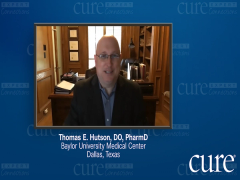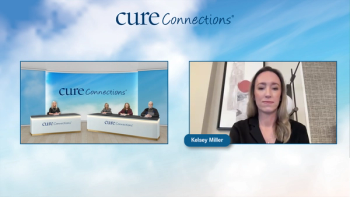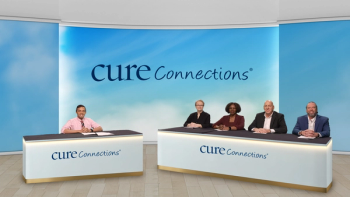
Emerging Agents for the Treatment of RCC
Urologic oncology expert, Dr Thomas E. Hutson, reviews additional agents and clinical trials in the pipeline for the treatment of RCC.
Episodes in this series

Thomas E. Hutson, DO, PharmD: There are a couple of other interesting studies that have been conducted or are ongoing. We are looking at newer therapies, and there are several brand-new therapies called HIF-2 alpha [hypoxia-inducible factor-2 alpha] inhibitors that are in phase 2 studies and now moving into phase 3 clinical trials. They are oral therapies and are being studied in combination as well as by themselves in patients with relapsed/refractory disease, so they’re generally second, third, fourth line. There has also been a new oral therapy, a new oral VEGF [vascular endothelial growth factor] inhibitor. I’d like to call the new one a second-generation VEGF inhibitor. The name of it is tivozanib. As a point of disclosure, I was also on the steering committee and an author of that particular trial presented recently, and now FDA [Food and Drug Administration]-approved in the United States. Tivozanib was studied in patients who had received multiple other therapies. They were patients with clear cell kidney cancer who had received prior checkpoint immune therapies. They’d received prior oral VEGF inhibitors, and some of them even received mTOR [mechanistic target of rapamycin] inhibitors. In fact, you could’ve had 2 or 3 previous therapies and then be eligible for enrollment on this trial. It was an international study where patients were randomized to receive either the tivozanib oral therapy given daily for 3 weeks followed by a 1-week break, versus sorafenib orally. Sorafenib was again the control arm, as it was already approved. It was the first oral therapy ever approved for renal cell cancer, and it is a therapy that has commonly been used in patients who have had multiple lines of therapy.
That trial was able to show that tivozanib provided significant advantages over sorafenib, where we saw the progression-free survival, the response rates, and overall survival nearly double of what we saw with sorafenib. This is the only trial that has been conducted that has had patients who have had checkpoint inhibitors and oral VEGF inhibitors as initial therapy. Thus, it was a very important trial that shows us tivozanib does provide activity, and based upon that and its approval, we now can use tivozanib in patients who have had prior therapies, have had these therapies and have had progression, and need to go on a new therapy. As a result, we can feel confident that based upon these data, this therapy will provide a benefit.
One of the areas of ongoing research is trying to find therapies that will improve cure rates after surgery in patients with local or locally advanced disease. Unfortunately, despite numerous clinical trials evaluating many of our therapies for metastatic patients, there has only been one trial that has been positive, and that is a trial of sunitinib administered for one year in patients with high-risk renal cell cancer, and that was defined as patients with stage 3 T3, T4, or N1 disease. These patients received either one year of sunitinib or one year of placebo. The absolute benefit was a 5% improvement on cure rate or relapse-free survival at 5 years. Thus, it’s a very small benefit. Unfortunately, however, despite that small benefit, there were significant side effects, and we found in the clinical trial that many patients did not make treatment the entire one year and were discontinuing therapy due to side effects. The sunitinib received regulatory approval as an adjuvant therapy, but is not used often, mainly because of the low benefit-to-side-effect ratio. We have anxiously been awaiting results from checkpoint inhibitor studies, immune therapy studies in the adjuvant setting, and thankfully we have now had our first trial recently presented showing benefits with adjuvant therapy with pembrolizumab.
This transcript has been edited for clarity.


